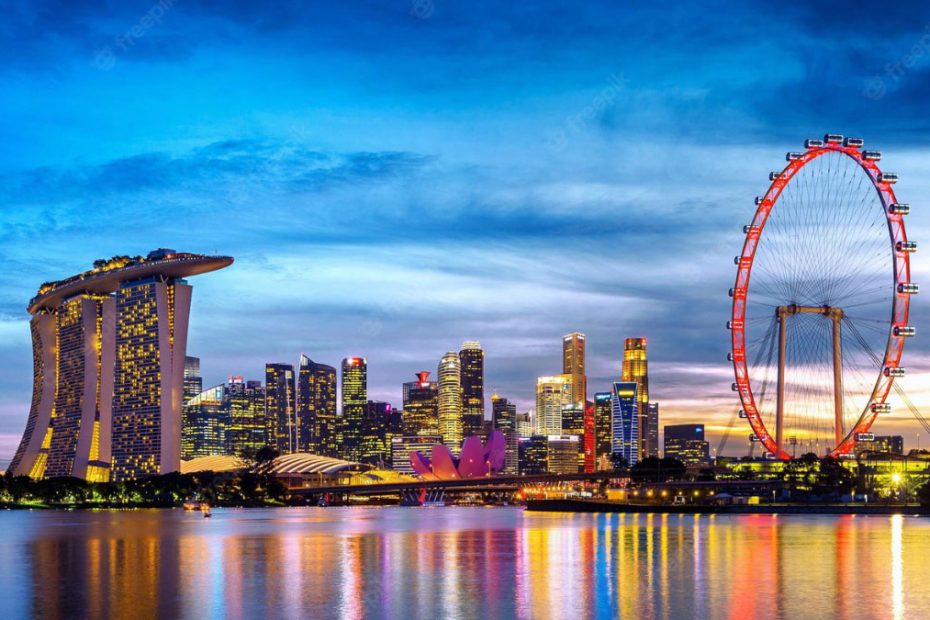Planning a trip to Singapore? This vibrant city-state offers a mix of modern marvels and rich cultural heritage. But before you jump into its bustling streets and iconic attractions, it’s crucial to know what not to do.
From social etiquette to local laws, Singapore has unique customs that might catch you off guard. Avoiding these common mistakes will not only help you blend in but also ensure a smoother, more enjoyable experience. So, let’s jump into the 15 mistakes you should steer clear of when visiting Singapore.
Key Takeaways
- Understand Local Laws and Customs: Singapore has strict regulations on activities like chewing gum and public behavior, which are strictly enforced to maintain social order and cleanliness.
- Plan Your Itinerary Wisely: Overplanning can lead to exhaustion due to Singapore’s hot and humid climate, while underplanning can result in missed opportunities. Aim for a flexible schedule to handle unexpected weather changes.
- Manage Finances Carefully: Carry some local currency for small purchases and be mindful of currency exchange rates. Inform your bank of travel plans to avoid card issues and consider travel insurance for extra security.
- Prepare for the Local Climate: Singapore’s weather is hot, humid, and prone to sudden rainstorms. Pack appropriate clothing, keep an umbrella handy, and stay hydrated.
- Respect Cultural Sensitivities: Understanding and observing cultural norms in attire and behavior can lead to a more respectful and enjoyable visit.
- Utilize Public Transport: The MRT and bus systems are efficient and affordable travel options. Familiarize yourself with taxi charges to avoid unexpected expenses.
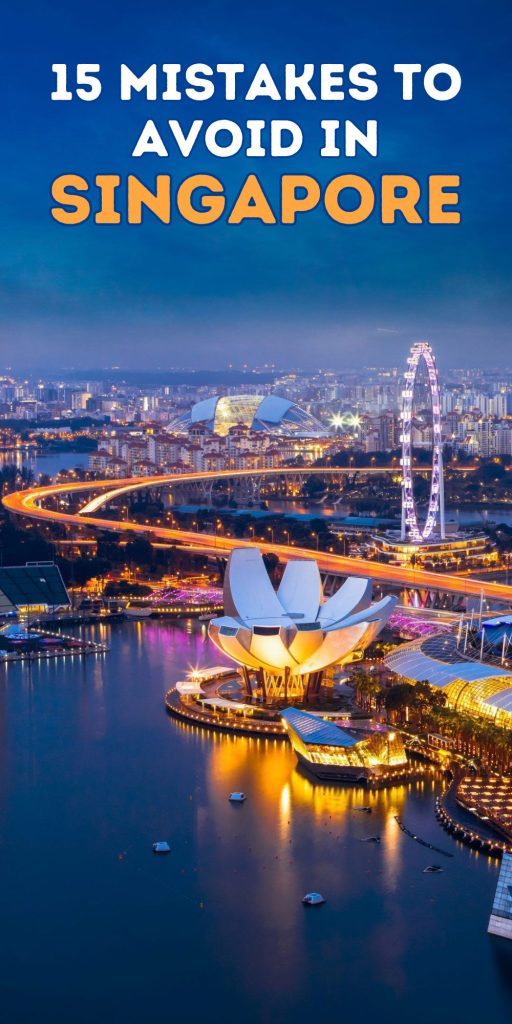
Not Understanding Local Laws And Customs

Chewing Gum Laws
Chewing gum is heavily regulated in Singapore. While not entirely banned, the sale of chewing gum is restricted. Chewing it in public places is generally frowned upon. This law aims to maintain the city’s cleanliness rather than targeting the act of chewing gum itself. If you’re caught improperly disposing of gum, you could face hefty fines.
Public Behavior Expectations
Maintaining proper public behavior is crucial in Singapore. For instance, littering, jaywalking, and vandalism are strictly prohibited. These actions can lead to fines or even imprisonment. High-end establishments and temples often have specific dress codes, requiring long pants, collared shirts, and sometimes head scarves for women. Failing to adhere could result in denial of entry, making it essential to respect these cultural norms.
Overplanning Or Underplanning Your Itinerary

Overplanning and underplanning can significantly impact your enjoyment in Singapore. Singapore’s blend of urban and natural attractions offers much to see and do, but balancing between too tight and too loose a schedule is key to a successful visit.
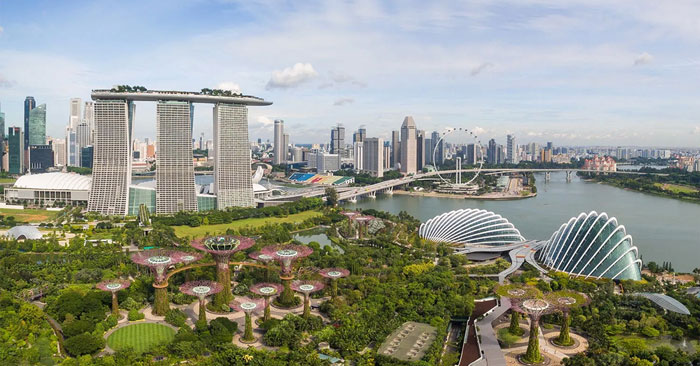
Overplanning
Attempting to pack too many activities into a single day can be exhausting. Singapore’s hot and humid climate intensifies fatigue, making it crucial to leave buffer time for unexpected events. The weather is notoriously unpredictable, and sudden rainstorms occur often. You might plan a day at Sentosa Island, but a mid-afternoon rainstorm could require a pause. Include rest periods in your itinerary and hydrate regularly.
Underplanning
But, not planning enough can mean wasted time and missed opportunities. Researching and creating a general itinerary beforehand will help maximize your time. Top attractions include Marina Bay Sands, Gardens by the Bay, and the Singapore Zoo. But, your plan should have room for flexibility. Sudden changes in weather or spontaneous interests are common, so a rigid schedule could prevent you from fully enjoying your visit.
Creating A Flexible Schedule
A flexible schedule is essential in Singapore due to the unpredictable weather. Rainstorms can stagger across your day, requiring quick pivots in plans. For instance, if heavy rains disrupt your plans to explore the Botanic Gardens, you could visit nearby museums instead. Shops, cafes, and indoor attractions offer respite during rain spells, allowing you to adapt without losing valuable time.
Factoring In Travel Time
Travel time between attractions in Singapore is another crucial factor. Though the public transportation system is efficient, traveling from one end of the city to another can consume more time than expected. For example, commuting from Changi Airport to Sentosa Island could take around an hour. Ensure your itinerary considers realistic travel durations, particularly during peak hours.
Exploring Singapore successfully means balancing structured plans with the flexibility to handle the unexpected, ensuring a more enjoyable and less stressful experience.
Mismanaging Your Finances

Mismanaging your finances in Singapore can quickly turn your trip into a costly try. Understanding the city’s financial world helps you avoid unnecessary expenses.
Not Bringing Enough Cash
Although Singapore is largely cashless, having some local currency (Singapore Dollars) is essential for small purchases. Hawker centers, for example, often prefer cash for transactions. While major restaurants, hotels, and shops accept credit cards and mobile payments, it’s prudent to carry at least SGD 50 to 100 for emergencies or small buys.
Losing Money In Exchange Transactions
Currency exchange can be tricky if you’re not careful. ATMs and reputable exchange services typically offer better rates than airport kiosks. To avoid losing money, use ATMs or exchange at well-known service providers like Travelex or money changers in shopping districts like The Arcade at Raffles Place. Be aware, hotel and airport exchangers usually have unfavorable rates.
Forgetting To Inform Your Bank
Before leaving, notify your bank of your travel plans to avoid your account being flagged for suspicious activity. An unexpected card suspension can be inconvenient. Also, check your bank’s foreign transaction fees. Some banks offer travel-friendly cards with low or no fees, which can save you money in the long run.
Neglecting Travel Essentials

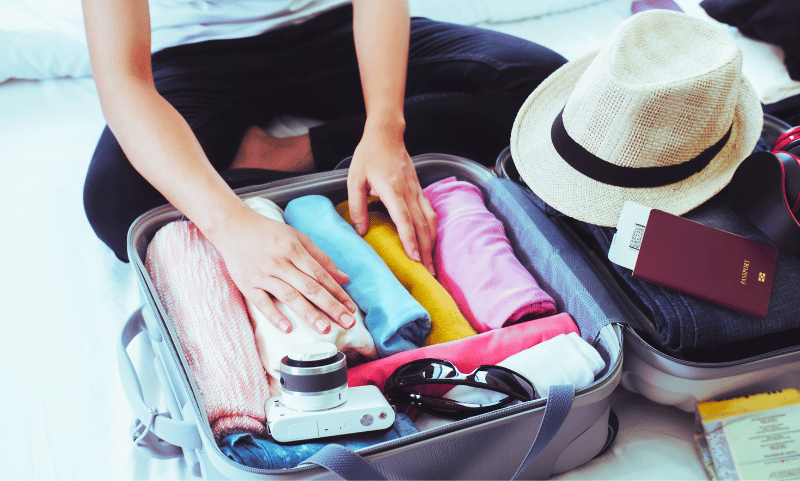
Heat and Humidity
Singapore’s relentless heat and humidity often catch tourists off guard. You’ll find the weather consistently hot and humid, so pack breathable clothing like short sleeves, shorts, and moisture-wicking fabrics. But, for visits to high-end restaurants or temples, bring formal attire like long pants and clothes that cover shoulders.
Rainstorms
Rainstorms are frequent and intense in Singapore. Carry an umbrella to shield you from both rain and the sun. Weather in Singapore can change quickly, so an umbrella is indispensable. Consider keeping one in your bag at all times.
Weather Preparation
Organize your itinerary around the weather. Sudden rainstorms can disrupt travel plans, causing delays and traffic congestion. Plan to stay indoors or under shelter during heavy rain, and adjust your schedule to avoid getting caught in downpours.
Not Having The Correct Visa
Verify your visa requirements well before your trip. Citizens from certain countries need a visa to enter Singapore, and the application process might take some time. Check the official Immigration & Checkpoints Authority (ICA) website for the latest information and requirements. Bring all necessary documents, including confirmations and any supplementary paperwork.
Missing Out On Travel Insurance
Travel insurance is essential for any trip abroad, and Singapore is no exception. Delay, loss of baggage, or medical emergencies can occur unexpectedly. Ensure your travel insurance covers medical expenses, trip cancellations, and baggage loss. This small investment offers peace of mind throughout your journey. Compare policies online to find the one that fits your needs best.
Failing To Prepare For The Local Environment


Not Checking The Weather Forecast
Singapore’s weather is consistently hot and humid year-round, making it essential to check the weather forecast. Knowing when to expect rain showers helps you plan activities better. Most afternoons feature brief but heavy downpours, and carrying a compact umbrella or a raincoat keeps you dry. Also, planning indoor activities during the rain ensures you maximize your time without disruptions.
Not Learning Basic Local Phrases
While English is widely spoken in Singapore, learning basic local phrases shows respect for the local culture and improves interactions. Simple greetings and thank-you’s in Malay, Mandarin, or Tamil can enhance your experience. For instance, “selamat datang” means “welcome” in Malay, “xie xie” means “thank you” in Mandarin, and “nandri” means “thank you” in Tamil. These small efforts help bridge cultural gaps and make your visit smoother.
Being Unaware Of Health And Safety Measures


Traveling to Singapore involves respecting its strict laws, preparing for the tropical weather, and adhering to specific dress codes. By understanding these key areas, you can ensure a smoother and more pleasant experience.
Respecting Local Laws
Ignorance of Singapore’s laws isn’t an excuse. For instance, not eating or drinking on public transportation like the MRT or buses can lead to fines. Jaywalking and littering are also strictly prohibited, resulting in fines or educational warnings. Always stay informed about local regulations to avoid unpleasant surprises during your visit.
Weather Preparation
Singapore’s climate is hot and humid throughout the year with frequent rainstorms. Not preparing for these conditions can make your trip uncomfortable. Bring an umbrella for both rain and sun protection, and adjust your travel plans according to the weather forecast. Lightweight, breathable clothing is recommended for dealing with the heat.
Dress Code
Though the weather is hot, certain places require specific attire. High-end restaurants and temples enforce dress codes that, if not followed, can lead to embarrassment or being turned away. For example, temples often require shoulders and knees to be covered. Carry a shawl or scarf to cover up when needed.
Tap Water Safety
In Singapore, tap water is safe to drink and meets World Health Organization (WHO) standards. This eliminates the need to purchase bottled water, which helps reduce plastic waste. Carry a reusable water bottle to stay hydrated, especially in the hot and humid climate.
Protecting Against Mosquitoes
Singapore has tropical weather, making it a breeding ground for mosquitoes. Use insect repellents containing DEET or picaridin, particularly when visiting green spaces like Gardens by the Bay. Wear long sleeves and pants in the evening to minimize mosquito bites. Be vigilant about dengue fever, especially during peak mosquito season from June to October.
Overlooking Public Transport Options


Singapore offers an incredibly efficient public transport system, yet many tourists overlook this cost-effective option. The Mass Rapid Transit (MRT) and bus services are reliable and cover most parts of the city. Embracing public transport can enhance your travel experience and save money.
Not Using MRT Or Buses
Skipping the MRT or bus means missing out on affordable travel. Taxis in Singapore come with a three-dollar surcharge and face traffic delays, making short trips on public transport more practical. For instance, use the MRT to travel from the bustling Orchard Road to Marina Bay Sands, or take a bus to explore the cultural enclave of Little India. Reserve taxis for longer distances like getting to the airport or visiting the Singapore Zoo.
Misunderstanding Taxi Charges
Understanding taxi charges can prevent unexpected expenses. Singapore taxis have a complex fare system with surcharges for peak hours, holidays, and certain locations like hotels. Familiarizing yourself with these charges is crucial. For example, a standard trip from Changi Airport to downtown can incur extra surcharges during peak hours or late nights. Using public transport for most of your journeys and reserving taxis for specific cases ensures a more budget-friendly trip.
Ignoring Cultural Sensitivities


Singapore is a vibrant, multicultural society blending Chinese, Malay, Indian, and other cultural influences. Respecting these norms is essential for a respectful and enjoyable trip. Understanding and observing local customs will enhance your travel experience.
Dressing Inappropriately
Singapore’s hot, humid climate doesn’t allow you to dress casually everywhere. High-end restaurants and certain cultural sites have specific dress codes. For example, when visiting temples or mosques, it’s important to dress modestly. Cover shoulders and knees; women might need to wear a head scarf. Easy-wicking clothes ensure comfort, but also be ready to dress up for specific venues.
Displaying Affection In Public
Public displays of affection are generally frowned upon. Holding hands is acceptable, but anything more may attract unwelcome attention. Be mindful of your surroundings, respecting local customs and maintaining public decorum. Adjusting your behavior shows respect for Singapore’s cultural sensibilities, ensuring smoother interactions.
Carrying Valuables Carelessly
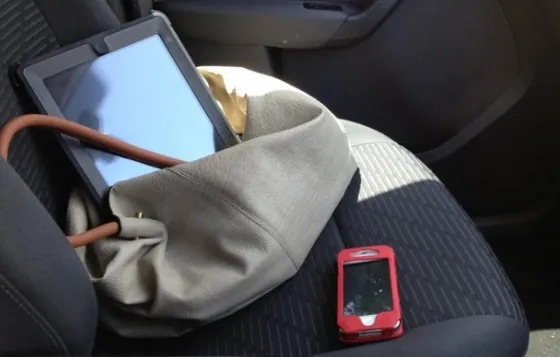
When traveling to Singapore, it’s crucial to remain cautious with your valuables to ensure a hassle-free experience. While the city is known for its low crime rates, petty theft can still occur.
Not Using Safe Storage
Take advantage of safe storage options offered by hotels and accommodations. Safes or secure storage facilities protect valuable items like passports, jewelry, and important documents. Storing these items securely lowers the risk of theft or loss. Explicitly putting items like jewelry and passports in a safe can prevent potential issues later.
Leaving Belongings Unattended
Never leave your belongings unattended in public places such as hawker centers, public transportation, or tourist attractions. Even a brief moment can be enough for theft. Always keep an eye on your bags and personal items to avoid unnecessary stress during your visit.
Dining In The Wrong Places

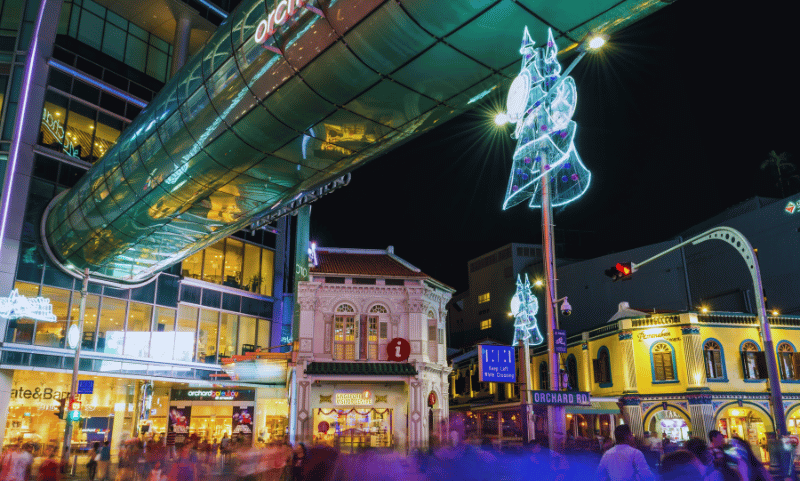
Visiting Singapore offers a vibrant culinary experience, but knowing where to eat is crucial. Eating in the wrong places can lead to disappointing meals and wasted money.
Tourist Trap Restaurants
Tourist trap restaurants often populate popular areas like Orchard Road, Marina Bay Sands, and Sentosa. These spots cater primarily to tourists, resulting in overpriced dishes that lack authenticity. Although the ambiance may seem appealing, these restaurants often prioritize aesthetics over quality. Instead, seek out eateries frequented by locals.
Missing Out On Hawker Centers
Hawker centers are quintessential to Singaporean culture and cuisine, offering an array of affordable, authentic local dishes. Even though their street food appearance, hawker centers maintain high hygiene standards regulated by the government. Avoiding these centers means missing out on real Singaporean flavors like Hainanese chicken rice, laksa, and char kway teow. For an immersive experience, visit renowned hawker centers like Maxwell Food Centre and Lau Pa Sat.
Underestimating The Cost Of Living

Singapore, a city renowned for its wealth and modernity, often surprises travelers with its high living costs. Accommodations, daily necessities, and experiences can quickly add up if you’re not prepared for the city’s financial demands.
High Food And Drink Prices
While Singapore’s hawker centers offer delightful and affordable local dishes, other dining options can be expensive. Hotel breakfasts, for instance, often exceed $30, whereas a meal at a Western-style café can cost over $20. Opt for local breakfasts like kaya toast for around $6 to keep food costs manageable.
Expensive Attractions
Many of Singapore’s iconic attractions come with steep entry fees. Access to Universal Studios Singapore costs around $79 for adults, while a visit to Gardens by the Bay, including the Flower Dome and Cloud Forest, can set you back $28. Plan your itinerary to balance these paid attractions with free experiences, like strolling through the Marina Bay Sands area or visiting the city’s numerous public parks.
| Accommodation Type | Average Cost per Night |
|---|---|
| Luxury Hotel | $500+ |
| Budget-Friendly Hotel | $150+ |
By understanding and preparing for these costs, you can enjoy Singapore’s offerings without unexpected financial strain.
Failing To Respect The Environment

In Singapore, respecting the environment is paramount. The city-state maintains impeccable cleanliness through strict rules and social norms about waste management and environmental protection.
Littering And Recycling
Littering is treated with utmost severity. Dropping trash carelessly can lead to substantial fines—up to SGD 1,000 for first-time offenders. Repeat violators face stiffer penalties, including Corrective Work Orders (CWO), where offenders pick up litter in public areas while wearing brightly colored vests. It’s crucial to use the numerous trash and recycling bins strategically placed around the city. The effort extends to cigarette butts and small items that often get overlooked.
Recycling follows a well-organized system. Singapore’s Blue Bin recycling program accepts items like clean plastic, glass, paper, and metal. Separate your waste accordingly to participate in this widespread initiative. Recycling bins are distinguishable by their lid labels and are located in residential areas, parks, and public spaces.
Wildlife Conservation Rules
Singapore’s attention to wildlife conservation is notable. The city enforces laws to protect local fauna and flora. Feeding wildlife, such as pigeons or monkeys, is prohibited and punishable by fines. This measure prevents dependency on human-provided food and maintains ecological balance.
Also, Singapore’s nature reserves and parks have specific guidelines. For example, designated trails should be followed to protect vulnerable habitats. Picking plants or disturbing animals isn’t allowed. Eco-friendly behaviors are encouraged to preserve the natural beauty and biodiversity of regions like Bukit Timah Nature Reserve and Sungei Buloh Wetland Reserve.
By adhering to these guidelines, you contribute to Singapore’s efforts to maintain its pristine environment and support wildlife conservation effectively.
Not Considering Communication Needs

When visiting Singapore, not preparing for your communication needs can lead to unnecessary stress. Staying connected is crucial for exploring the city, contacting hotels, and keeping in touch with your family and friends.
Checking Your Cell Phone Plan
It’s important to check your cell phone plan before arriving in Singapore. Many plans have high international roaming charges that can quickly add up. By knowing your plan’s coverage and rates, you can avoid unexpected bills.
Getting A Local SIM Card
To save money, consider getting a local SIM card upon arrival in Singapore. They’re widely available at airports, convenience stores, and telecom shops. This option offers a cost-effective way to stay connected without incurring high roaming charges.
Ignoring Flight And Travel Logistics

Properly managing flight and travel logistics is crucial when visiting Singapore. Ensure smooth connectivity and save time by avoiding these common mistakes.
Booking Flights Too Close Together
Booking connecting flights with short layover times can lead to missed flights. Singapore Changi Airport is large, and exploring through immigration, customs, or security can take time. Allow at least 2-3 hours between connecting flights to accommodate any delays or unexpected procedures.
Not Factoring In Security Checks
Security in Singapore is stringent. Arrive at the airport at least 3 hours before your flight. Factor in additional time for security checks, especially during peak hours. Singapore’s efficient but thorough security protocols can sometimes cause delays, so an early arrival ensures a stress-free experience.
Conclusion
Avoiding common mistakes in Singapore can significantly enhance your travel experience. By understanding local customs and laws, respecting cultural norms, and managing your itinerary wisely, you’ll blend in seamlessly and enjoy everything the city has to offer. Proper financial planning and packing appropriately for the climate will ensure you stay comfortable and stress-free. Utilizing public transport and being mindful of your valuables will keep your trip smooth and budget-friendly. Embrace local dining options and respect environmental guidelines to fully appreciate Singapore’s unique charm. With these tips in mind, you’re all set for a memorable and enjoyable visit to this vibrant city.
Frequently Asked Questions
What are some common mistakes to avoid while visiting Singapore?
Travelers should avoid littering, jaywalking, and vandalism due to strict laws. Dress modestly in high-end establishments and temples, plan a flexible itinerary, manage finances wisely, and respect local customs to blend in seamlessly with the local culture.
What are the regulations about chewing gum in Singapore?
Chewing gum is regulated to maintain cleanliness. Importing and selling gum is restricted, but medical gum is permitted in limited quantities. Avoid chewing gum publicly to adhere to local rules.
Why is it important to plan a flexible itinerary in Singapore?
Singapore’s hot, humid climate and frequent rains require a flexible itinerary. Overplanning can lead to exhaustion, while underplanning may cause missed opportunities. Balance your schedule to accommodate weather changes and travel times.
How should I manage my finances while traveling in Singapore?
Despite being cashless-friendly, carry some Singapore Dollars for small purchases at hawker centers. Use ATMs or reputable currency exchange services, notify your bank of travel plans, and check for foreign transaction fees to manage expenses efficiently.
What should I pack for a trip to Singapore?
Pack breathable clothing for daily wear, formal attire for high-end venues, and a compact umbrella for frequent rainstorms. Verify visa requirements and obtain travel insurance to cover potential issues such as delays or medical emergencies.
How can I prepare for the local environment in Singapore?
Check the weather forecast regularly and carry an umbrella. Plan indoor activities during rain showers and learn basic local phrases in Malay, Mandarin, or Tamil to show respect and enhance cultural interactions.
What are the health and safety guidelines for visitors in Singapore?
Avoid eating and drinking on public transportation, dress modestly in formal venues, and use mosquito repellents to guard against bites. Tap water is safe to drink, but always adhere to local laws to avoid fines.
How reliable is Singapore’s public transport system?
The Mass Rapid Transit (MRT) and bus services are cost-effective and reliable. Utilize public transport for most journeys, reserving taxis for longer distances to avoid extra charges and delays.
What cultural sensitivities should I be aware of?
Dress modestly at high-end restaurants and cultural sites, avoid public displays of affection, and respect the multicultural society’s customs and norms to enhance your travel experience and show respect.
How can I keep my valuables safe while traveling in Singapore?
Despite low crime rates, petty theft can occur. Utilize hotel safes for important items like passports and jewelry, and never leave belongings unattended in public spaces to avoid unnecessary stress.
How can I enjoy authentic local food in Singapore?
Avoid tourist trap restaurants and seek local eateries or hawker centers for affordable, authentic dishes like Hainanese chicken rice and laksa. These centers maintain high hygiene standards and offer a genuine culinary experience.
How can I manage the high cost of living in Singapore?
Prepare for high prices on accommodations and daily necessities. Opt for local breakfast options, balance your itinerary with paid and free attractions, and be mindful of spending to avoid financial strain.
What are Singapore’s environmental guidelines I should follow?
Avoid littering to prevent hefty fines, use recycling bins, and follow wildlife conservation laws. Adhere to guidelines in nature reserves to contribute to Singapore’s efforts in maintaining cleanliness and protecting local ecosystems.
How can I manage communication needs while in Singapore?
Check your cell phone plan for roaming charges and consider getting a local SIM card for cost-effective communication. Staying connected helps in exploring the city and keeping in touch with family and friends.
What should I consider for flight and travel logistics at Singapore Changi Airport?
Avoid booking tight connecting flights, allowing at least 2-3 hours for layovers due to significant immigration and security times. Arrive at the airport at least 3 hours before departure to ensure a smooth travel experience.

